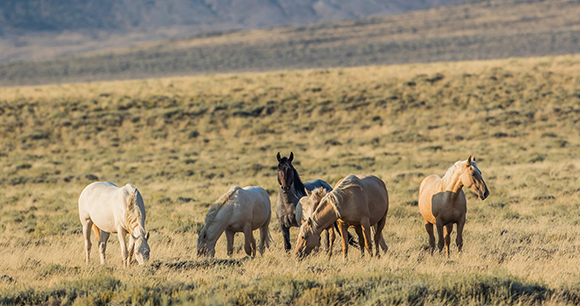
Update (September 11, 2025): In an important development, attorneys for the Bureau of Land Management have confirmed the agency will not commence the roundup on October 13, 2025. Further, the agency indicated it will not attempt to move forward before summer 2026. This pause provides critical time for our lawsuit to be heard in court.
Cheyenne, Wyo.—The Animal Welfare Institute (AWI) and American Wild Horse Conservation (AWHC), along with renowned photographers and conservation advocates, today filed another lawsuit in federal court to stop the Bureau of Land Management (BLM) from carrying out its plan to permanently remove three historic wild horse herds in Wyoming's Checkerboard region: the Salt Wells Creek herd, the Great Divide Basin herd, and the Rock Springs portion of the Adobe Town herd. Ultimately, AWI and AWHC seek to prevent the permanent eradication of more than 3,000 federally protected wild horses from Wyoming’s public lands.
The lawsuit, which was filed in the US District Court for the District of Wyoming, is necessitated by the BLM’s announcement that it will begin roundups to eliminate these herds on October 13, in defiance of a federal appellate court ruling that found the land use plan amendments authorizing the BLM’s eradication plan to be unlawful and arbitrary.
In planning documents, the BLM repeatedly acknowledged that areas under consideration for its eradication plan contained adequate forage, water, space, and other resources to sustain wild horse herds and maintain a thriving natural ecological balance—a central mandate of the Wild Free-Roaming Horses and Burros Act. In July 2025, the Tenth Circuit Court of Appeals ruled in favor of AWI, AWHC, and other plaintiffs, holding that the BLM ignored its statutory duty to base decisions on whether these lands could sustain a thriving natural ecological balance. The court characterized the agency’s actions as “arbitrary and capricious.”
“The Tenth Circuit made very clear that the Bureau of Land Management cannot use its land management planning process to skirt its obligations under the law—namely to protect wild horses on public lands designated as their habitat,” said Joanna Grossman, Ph.D., equine program director for AWI. “For the agency to now try to move forward with a roundup plan to permanently remove thousands of these federally protected animals—even when the underlying management decision was found to be unlawful—is neither legal nor rational.”
“These wild horses are living symbols of our Western heritage, protected by Congress in 1971,” said Suzanne Roy, executive director of AWHC. “The BLM’s attempt to wipe them from the wild isn’t just illegal, it’s a direct insult to the rule of law and the American people who cherish these animals.”
This marks the eighth legal action AWHC has taken over the last 14 years challenging the BLM’s unlawful actions in Wyoming. Since 2019, AWI has joined AWHC in advocating protection of Wyoming’s wild horses. In 2021, both groups jointly delivered over 70,000 signatures to the Department of the Interior, urging the department to stop the BLM’s plans to remove thousands of wild horses from the Checkerboard.
A history of litigation for the Checkerboard horses can be found here. AWI, AWHC, and their co-litigants are represented by the public interest law firm Eubanks & Associates, PLLC.
Marjorie Fishman, Animal Welfare Institute
[email protected], (202) 446-2128
Amelia Perrin, American Wild Horse Conservation
[email protected], (919) 619-4913
The Animal Welfare Institute (awionline.org) is a nonprofit charitable organization founded in 1951 and dedicated to alleviating animal suffering caused by people. We seek to improve the welfare of animals everywhere: in agriculture, in commerce, in our homes and communities, in research, and in the wild. Follow us on Facebook, Instagram, Threads, Bluesky, and LinkedIn for updates and other important animal protection news.
American Wild Horse Conservation (AWHC) is the nation’s leading nonprofit wild horse conservation organization, with more than 700,000 supporters and followers nationwide. AWHC is dedicated to preserving the American wild horse and burros in viable, free-roaming herds for generations to come, as part of our national heritage. In addition to advocating for the protection and preservation of America’s wild herds, AWHC implements the largest wild horse fertility control program in the world through a partnership with the State of Nevada for wild horses that live in the Virginia Range near Reno.